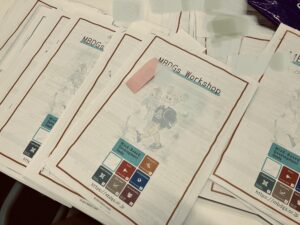Report of Validation Results of Self-Establishment workshops
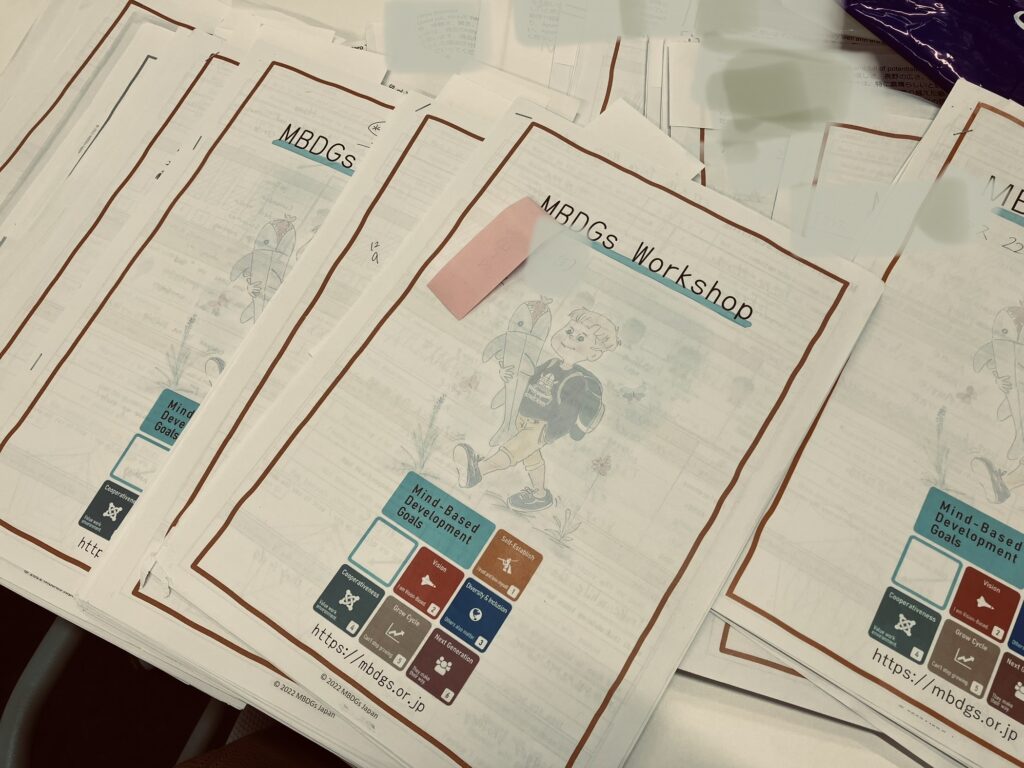
Contents
- Verification target & method
- Background of the introduction of MBDGs
- Effect details
- 1.I think I have ability.
- 2.I think I’m worthy.
- 3.I have confidence in myself.
- 4.I’m sure I can do it if I try.
- 5.I think I’m doing well.
- 6.I think my ability is utilized.
- 7.I don’t think there can be a future my abilities are not utilized.
- 8.I believe that my past experiences have contributed to my current self.
- 9.I’m proud of my values/thoughts.
- 10.I can rest without hesitation when I’m tired or unmotivated.
- 11.I feel that my future is getting more fulfilling.
- 12.I want to challenge my potential.
- 13.Excitement wins over fear when I hear the word “challenge”.
- 14.There will certainly be setbacks and hardships, but I think I can overcome them.
- 15.I am taking good care of myself.
- 16.I admire myself for doing my best.
- 17.I can be honest with my feelings rather than people’s opinions and evaluations.
- 18.I want to start a business.
- 19.Now I have a job that I want to do.
- 20.I feel that there is a job and a role that only I can do.
- 21.Even if I can’t imagine anything concrete, I’m going to challenge something.
- 22.I have a vision (ideal future) that I want to achieve.
- 23.I am very fulfilled in the vision I want to achieve (ideal future).
- 24.The vision (ideal future) I want to achieve includes the happiness of other people.
- 25.When I think of a vision (ideal future) that I want to achieve, a concrete image (such as an photo or video) comes to mind.
- 26.I believe that my future self will have the desired performance, evaluation, and income.
- 27.I want to make my vision come true by working together with my team members.
- 28.There is no superiority or inferiority in visions, and I believe that whatever vision I have is wonderful.
- 29.I believe I can use my strengths to achieve my vision.
- 30.I would like to meet more people who think differently than I do.
- 31.I often think that there must be a reason why people say or do things that I can’t understand.
- 32.I’m proud of my country.
- 33.I feel embarrassed or not good at speaking English.
- 34.I think it’s fun to talk to people about myself, listen to what people have to say, and deepen relationships.
- Voice of participants
- Trainer’s opinions
Verification target & method
- 12 workshops of 90 minutes each for about 4 months in a management university named iU in Japan
- 157 students in 1st and 2nd year studying management
- About 95% of the students are Japanese
- The workshop was conducted basically in English with supplementary explanations in Japanese (English was used because the class theme is to develop human resources who can play an active role in a global environment)
- The content is mainly to establish Self-Awareness (Step.1 is Self-Understanding, Step.2 is Self-Approval, Step.3 is Self-Trust part. A little contents of Vision, Diversity, and Cooperativeness were also introduced in some works.)
- Questionnaire survey conducted twice (implemented in the first and final months of the workshop)
- Incorporating presentations, group work, group discussions, etc as well.
Background of the introduction of MBDGs
Dr. Joe Hug, a professor who has taught management and global business skills at this university and at some universities worldwide, has long been aware of the problem, “Even if we teach management and skills to students, they need to develop their mind that makes use of them”. Thinking that systematically programmed mind education can solve the problem, he proposed to the university that the MBDGs workshop be introduced as a required subject for students at his university of management. The introduction was decided by the university manager who understood the details of MBDGs.
Effect details
The results of the questionnaire surveys conducted in the first and final months of the workshop are as follows. The graph on the left shows the results of the first questionnaire, and the graph on the right shows the results of the second questionnaire. There are feedback analysis by the trainer for each question.
1.I think I have ability.
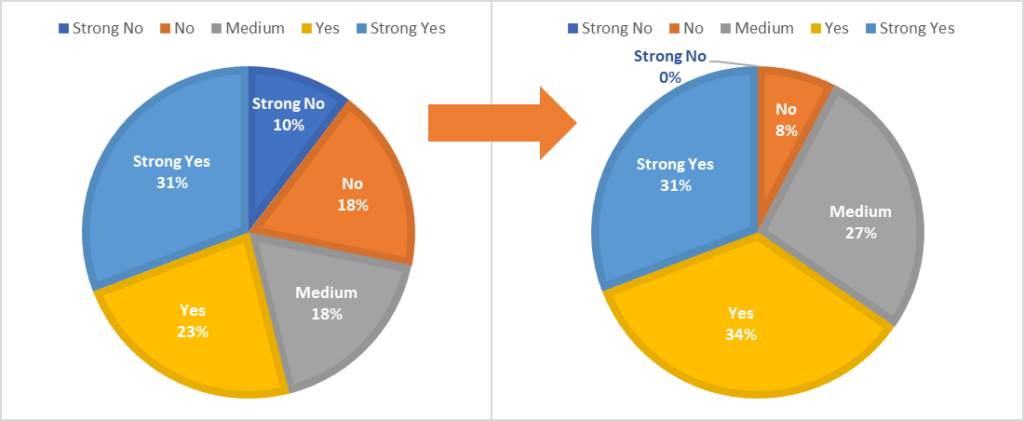
Initially, 46% of students were not fully aware of their abilities. Also, 10% of them answered that they have no ability. In the second survey, the percentage of students who answered they have no ability decreased to 0%, and 65% answered that they have ability or have considerable ability, an increase of 11% from 54%.
The workshop started with Self-Understanding work. Deepen their Self-Understanding, listen to the opinions of those around them, and know themselves. The procedure of recognizing their good points continued in subsequent work and relationships with the trainer.
2.I think I’m worthy.
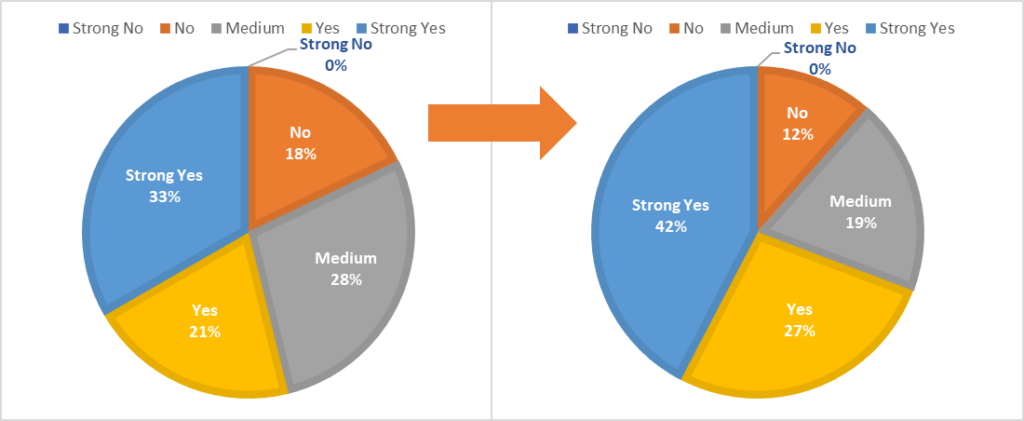
The most meaningful and positive change in this workshop is this part. Regarding Self-Esteem, which is the basis of Self-Approval, the percentage of students who think they are worthy has increased from 54% to 69%, but this cannot be simply compared with numbers alone.
In the Self-Approval work, a characteristic of Japanese participants in particular is that many of them are resistant to the very words “the worth of/in myself” or “human’s value.” In fact, before the workshop started, 54% of the students answered that “they are valuable/worthy”, but in the workshop, they began to think about Self-Existence (awareness of the existence value of themselves and others) as something close to them. Nearly 70% of the students initially felt resistance during the work. In the impressions of the students during the work, there were opinions such as “I am reluctant to speak the word ‘value’ of people and myself”, “value is not decided by someone”, or “human’s value is not something we should talk in public”. The trainer found that so many students were emotionally confused by the work. In other words, at the stage before the workshop started, if they were asked “Do you think you are worthy?” in words only, they answered “Yes”. However once they thought about their own value and the value of others concretely in the workshop, many of them felt resistance.
On the other hand, the number of students who answered “I am worthy” in the second survey was the result of deeply facing “own value and human’s value” in the work. As they confronted their sense of self, some became emotionally distraught and questioned their trainer with confusion. Some of them also suggested that the words used should be changed from human’s “value” to human’s “goodness”, which would be less objectionable. However, the effect of using the word “value” here is important, so the trainer proceeded without changing the word.
As a result, although many students felt conflicted and uncomfortable, the impression of the trainer was that this part was the most important effective. In terms of numbers, it’s only a 15% increase, but this is the biggest achievement in this workshop. No matter how many times they are asked, it is essential to grow into a state where they can answer “I am valuable/worthy” and “Human beings are worthy in the first place” in order to Self-Establish. This sense of Self-Existence is the core of establishing Self-Awareness.
This part of the work is conducted taking into account characteristics that vary greatly depending on nationality. Since 90% of the participants this time were Japanese, the workshop was held in consideration of the low awareness of Self-Existence Value that is characteristic of Japanese people.
3.I have confidence in myself.
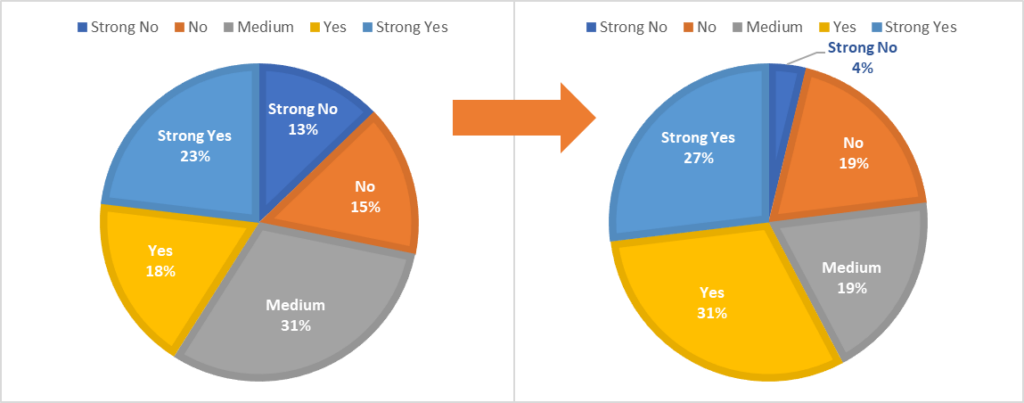
Many of the students were people aiming to start a business, but they weren’t necessarily confident in themselves, and many were in a hurry to accomplish something big to make up for their lack of self-confidence.
The number of students who answered that they are confident in themselves increased from 41% to 58%. The number of students who answered they are not confident dropped from 13% to 4%.
There are no opportunities to acquire new skills within the workshop, and by changing their perception of themselves, they became more confident in themselves. For that reason, in the Self-Understanding part, we carefully worked to dig into the past and connect the past and the present self, thereby increasing the degree of digestion of the past. In addition, the awareness that is truly necessary for growth is not the awareness of looking at one’s own lacking abilities and correcting oneself, but the awareness of wanting self-growth through self-improvement born from acknowledging one’s own efforts and approving oneself. There is no difference in motivation for growth whether born from self-denial or self-approval, but the latter is ideal if we put importance on stability and sustainability of growth. In that sense, the Self-Approval part has a very important position.
4.I’m sure I can do it if I try.
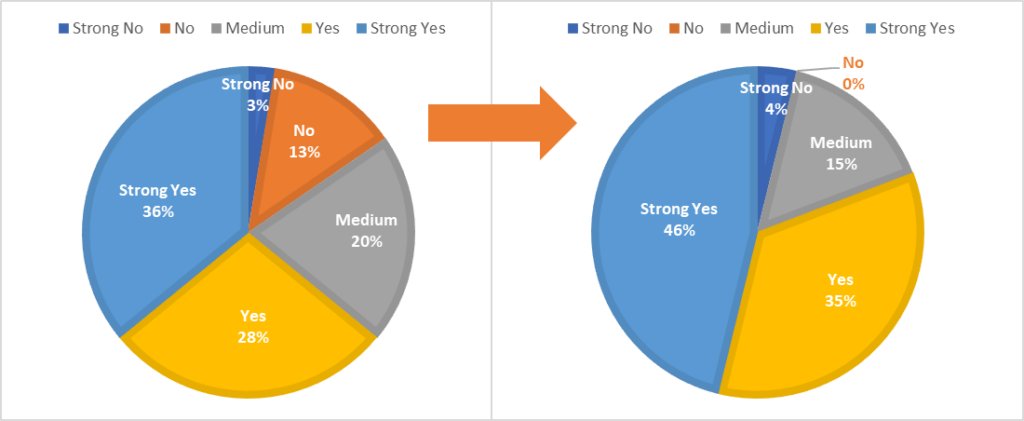
The part “I think I can do it if I try” is the effect obtained by the Self-Trust part through Self-Understanding and Self-Approval. The percentage of students who believe they can do it has increased from 64% to 81%. During the 4 month workshop, we did only a part of the Self-Trust, but we still saw a lot of growth in it.
The reason why the Self-Trust part(Step.3 in Self-Establishment) was only partially implemented was that many students needed Self-Understanding and Self-Approval(Step.1&2) parts more than expected. However, by carefully advancing the Self-Understanding and Self-Approval parts, their self-confidence increased as a result. If the Self-Trust part had been completed, it would have progressed to learning how the students put themselves into the growth cycle.
5.I think I’m doing well.
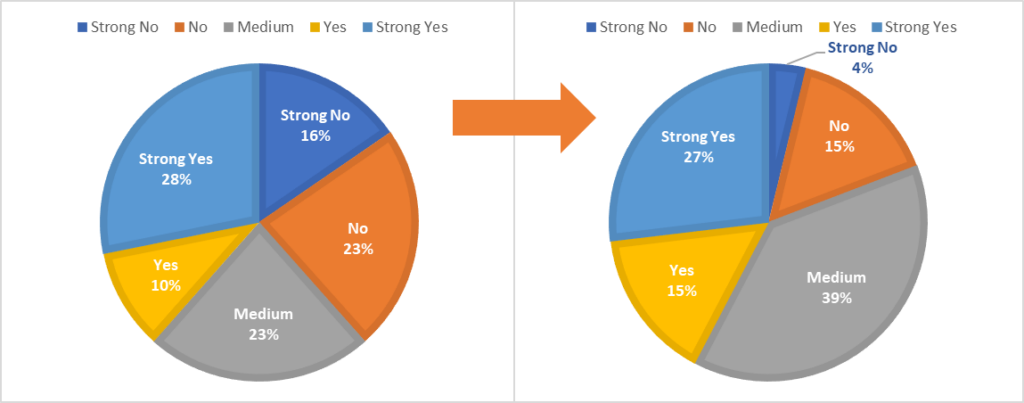
In response to the question “I think I’m doing well,” the number of students who answered they weren’t doing well/enough decreased from 39% to 19%. This is mainly the result of the work of carefully remembering and organizing their past in the Self-Understanding and Self-Approval parts.
In fact, there were many students who felt regret and a sense of insufficiency in their past, but by changing the perspective of capturing their past event to multiple perspectives, the same past can be changed from “regret/insufficient” to “piling up of experiences/the facts that I did well at that point”. There were many who were able to get to recognize their past events as “my hard work and the experiences that brought me to my current strengths.” This is also a question that shows Self-Approval and digestion of the past, and shows that many students were able to turn the past into a boost.
6.I think my ability is utilized.
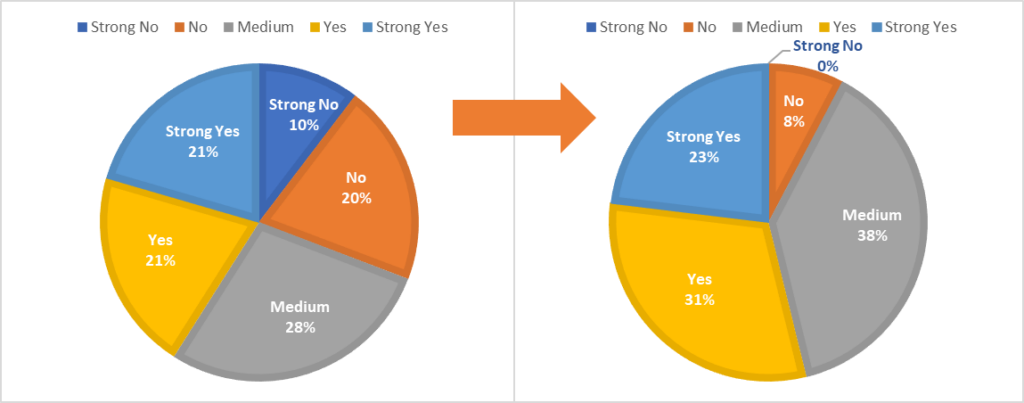
The number of students who answered “I am making good use of my ability at this point” rose from 42% to 54%. Many of the students who take the workshop are aiming to start a business, but in most cases the actual details of the business have not yet been determined. This is a reason why they think their ability is not utilized yet.
7.I don’t think there can be a future my abilities are not utilized.
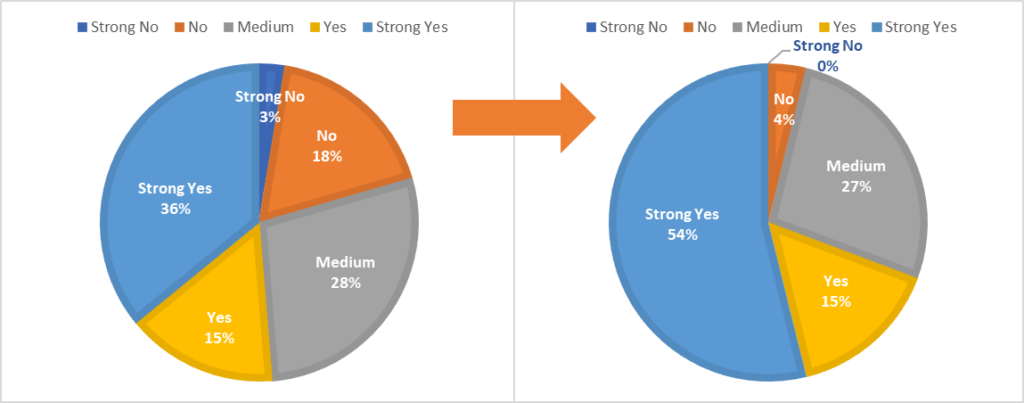
On the other hand, the number of students who answered that “I don’t think there can be a future my abilities are not utilized” increased from 51% to 69%, and those who answered “I don’t think my ability will be utilized in the future” decreased from 21% to 4%. Through Self-Understanding and Self-Approval, they changed their mindset from “feeling impatient because my future plan is uncertain” to “thinking that the time will come when I can make use of my abilities even if the future is uncertain yet”. It makes it possible for them that this way of thinking brings themselves patience.
8.I believe that my past experiences have contributed to my current self.
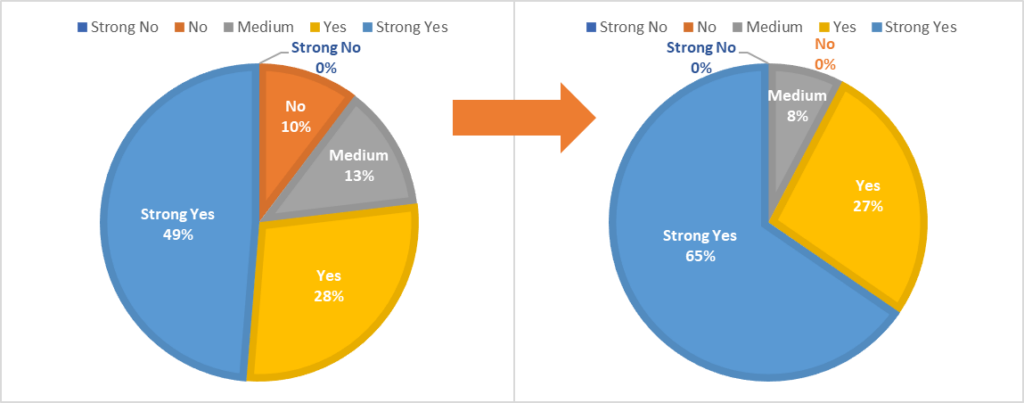
This represents past digestion. The percentage of students who realized that their past, mainly bitter experiences, led to their current abilities and attractiveness increased from 77% to 92%. In the self-work part of the work that increases the digestion of the past, the trainer do not recommend them to face their past if they feel uncomfortable, considering the degree of digestion of the past that differs depending on the student. Just looking at the work of other students will be effective enough. In fact, even for those who did not face the past at the beginning, points were prepared to increase the degree of digestion of the past at their own timing during the four months, leading to a result of 92%.
9.I’m proud of my values/thoughts.
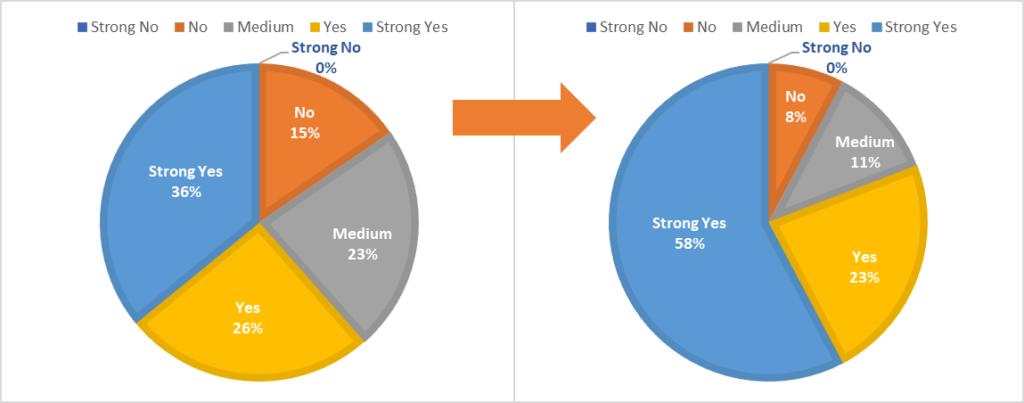
The percentage of students who can have pride and confidence in their own thoughts/values/feelings has risen from 62% to 81%. In the beginning, when expressing one’s own thoughts, many students listened to the opinions of those around them before speaking out. But as the workshops advanced, they became able to show their thoughts with confidence and without caring too much about others’ thoughts. This is influenced by the fact that the rules for “how to speak out about oneself and how to listen to what others are saying”, which are explained at the beginning of the workshop, are greatly connected not only to action but also to awareness.
10.I can rest without hesitation when I’m tired or unmotivated.
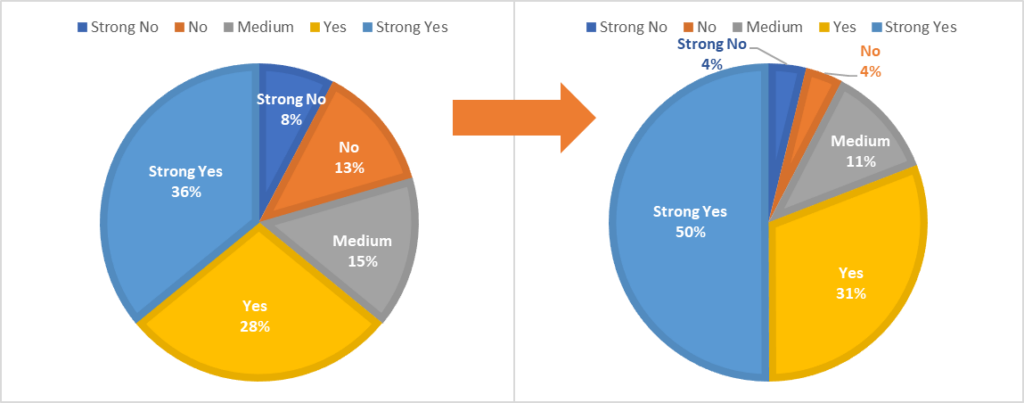
This question, which measures self-management skills and the quality of rest, reduced the number of students who felt guilty about resting from 21% to 8%. Feeling guilty about resting is especially common among Japanese participants, and it is more pronounced among adults than among students. Guilt can be reduced by logically understanding how following the voices of one’s body and mind affects one’s productivity, sustainability, and creativity as human resources. But this is subject to Self-Understanding and Self-Approval. Even if they understand that resting their body is for themselves, the reason they can’t get enough rest (the quality of your rest is poor) is because there is a hidden impatience that resting will lower their self-worth.
11.I feel that my future is getting more fulfilling.
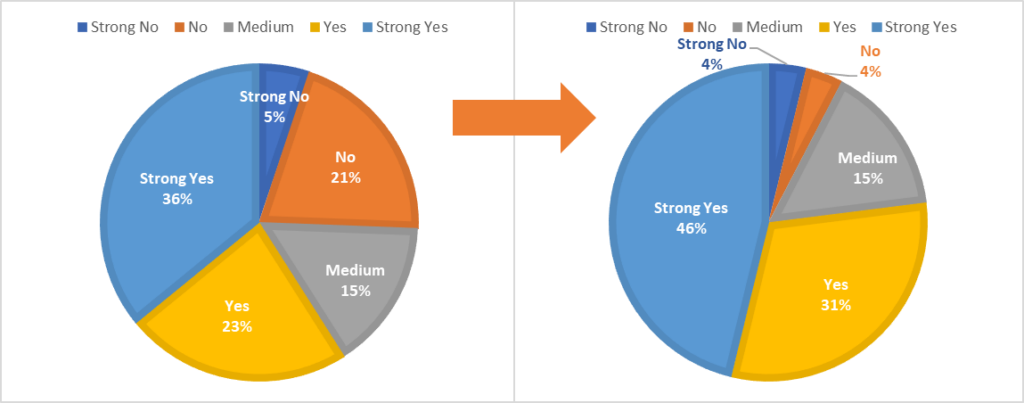
The number of students who see brightness/fulfilling in their future has increased from 59% to 77%. In the workshop, we slightly mentioned to a part of “Vision” that is the part after Self-Establishment, and provided opportunities to think about the ideal vision in the first and fourth months. However, since the vision is something that naturally springs out of the mind after Self-Establishment, in this workshop of Self-Establishment, the trainer encouraged those who have a vision to draw it, and those who do not have it to write openly, “I don’t have it now.” In the end, everyone drew their vision.
12.I want to challenge my potential.
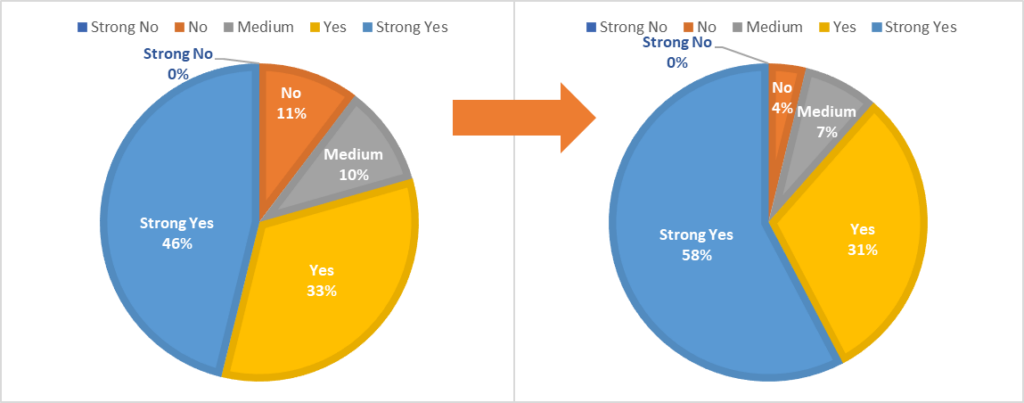
Those willing to challenge their potential rose from 79% to 89%. 11% said they didn’t want to, but through the Self-Understanding and Self-Approval part, some found that starting a business or challenging were not necessarily the best path for them.
13.Excitement wins over fear when I hear the word “challenge”.
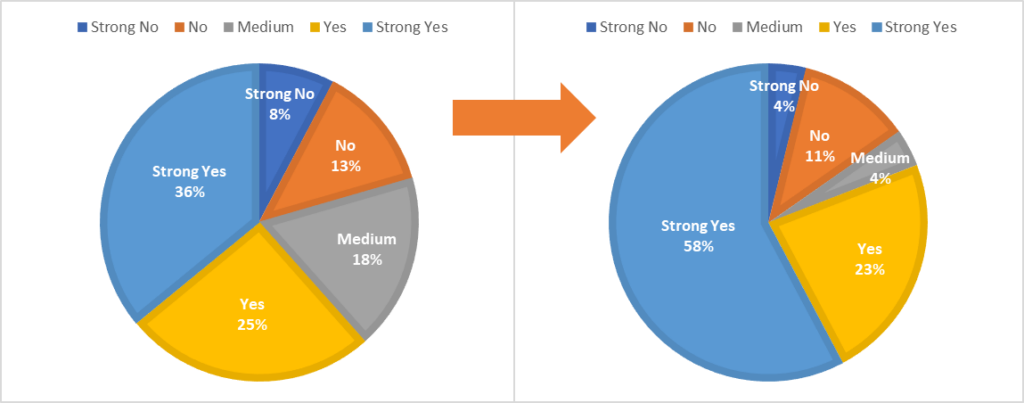
This is a question that measures self-confidence, but when asked about a challenging, the percentage of students who felt positive overwhelmed fear and worry rose from 61% to 81%. In this part of the workshop, the students understood that it is also important to embrace emotions such as fear and impatience when they hear the word “challenge,” and that it is important to recognize and accept themselves as having such emotions.
14.There will certainly be setbacks and hardships, but I think I can overcome them.
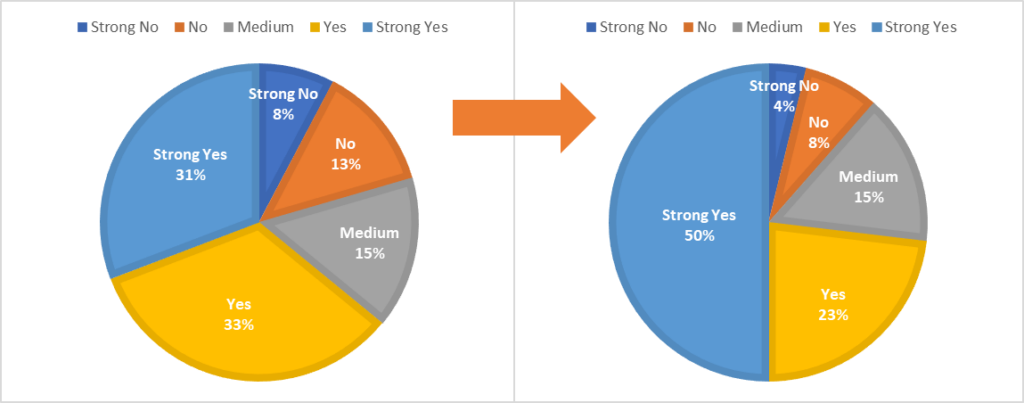
This is also a question to measure self-confidence. The number of students who think they have the power to overcome difficulties has increased from 64% to 73%. This can be seen as a result of the Self-Understanding and Self-Approval part of acquiring the habit of perceiving their own experiences and characteristics from multiple perspectives.
15.I am taking good care of myself.
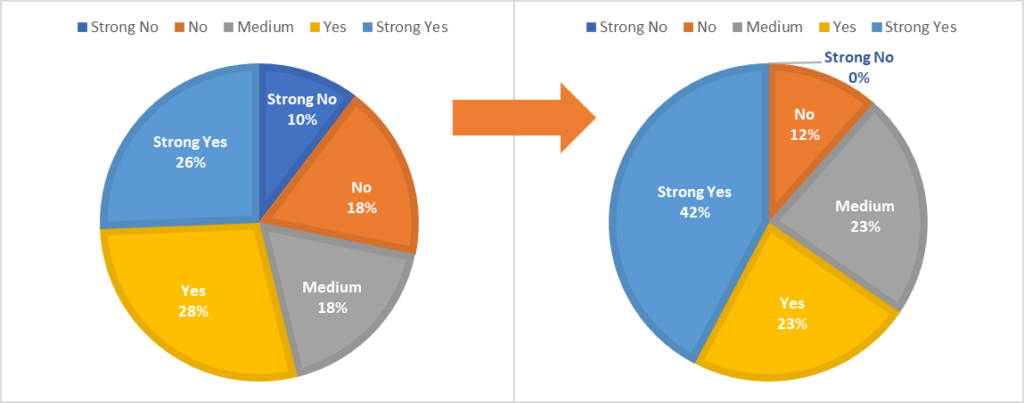
This is a question to measure the degree of Self-Approval and taking good care of themselves. The percentage of students who feel they are taking good care of themselves has risen from 56% to 65%, but there is a hidden background behind this number.
In the work, when they face the part of “how much I am aware of and respond to the hopes and voices hidden in myself”, they answered that they were not able to recognize their inner voice or true hope. The answers in the second survey are the numbers after experiencing the work of recognizing that they were not facing their inner voice or true feelings. This is the result of asking how much they can evaluate themselves as taking good care of themselves.
16.I admire myself for doing my best.
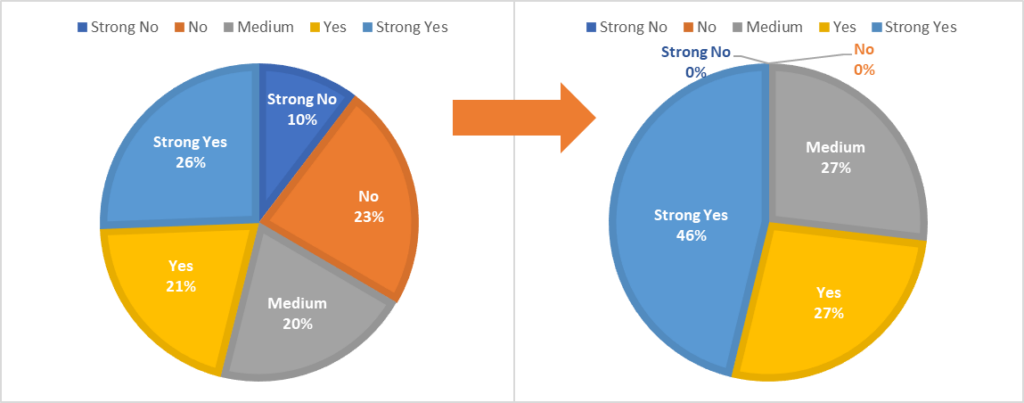
In the question of acknowledging one’s hard work or efforts, which represents a part of Self-Approval, and measuring awareness of one’s Self-Esteem, it was shown that consideration for themselves is taking root. The number of students who answered that they recognize the efforts they made has increased from 47% to 73%.
In Self-Approval ability, it is important to develop a habit of evaluating own efforts and experiences on one’s own consciousness without obtaining approval (evaluation, encouragement, pointing out good aspects, etc.) from trainers or other participants.
17.I can be honest with my feelings rather than people’s opinions and evaluations.
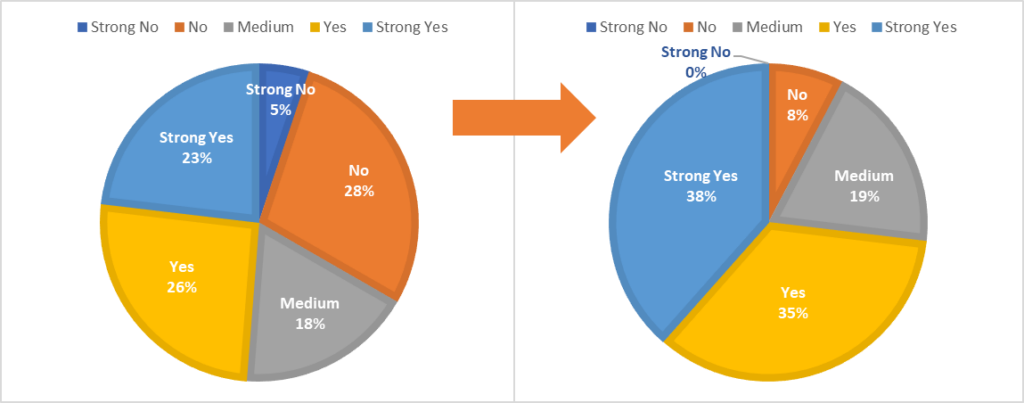
At the beginning, there were many students who self-aware that they were easily swayed by others. At the end, the number of students who can act and decide their actions according to their feelings has increased. The number has risen from 49% to 73%.
18.I want to start a business.
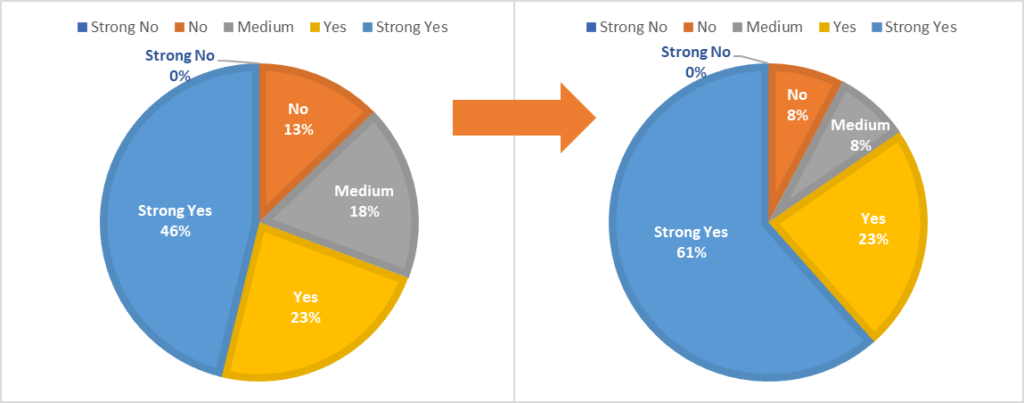
The percentage of students who answered that they would like to challenge themselves to start a business rose from 69% to 84%, but on the other hand, as they deepened their Self-Understanding, some students realized that starting a business was not their true desire.
19.Now I have a job that I want to do.
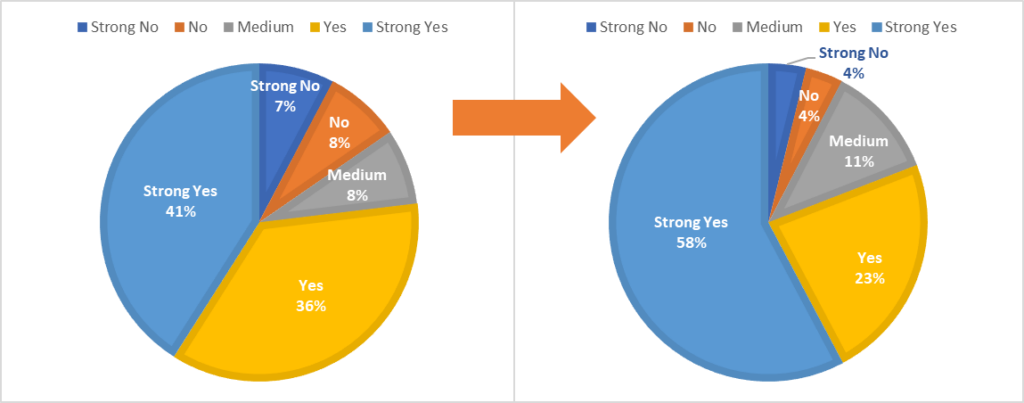
The percentage of students who have a clear idea of what job they want to do has increased from 41% to 58%. The number of students who answered they had nothing they want to do decreased from 15% to 8%. There is a difference between “15% filled with anxiety” and “8% confidently waiting for that moment” because they firmly understood that the timing will definitely come.
20.I feel that there is a job and a role that only I can do.
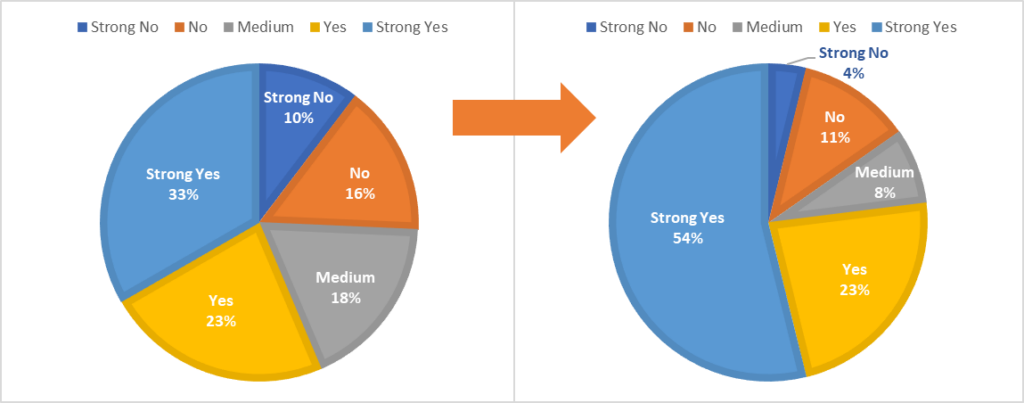
This question measures how much they are aware of their Existence-Value and whether they can trust themselves in their potential. The percentage of students who feel that there is a job or role that only they can do has increased from 56% to 77%. This number is expected to rise further as they take the Vision workshops that follow the Self-Establishment workshop.
21.Even if I can’t imagine anything concrete, I’m going to challenge something.
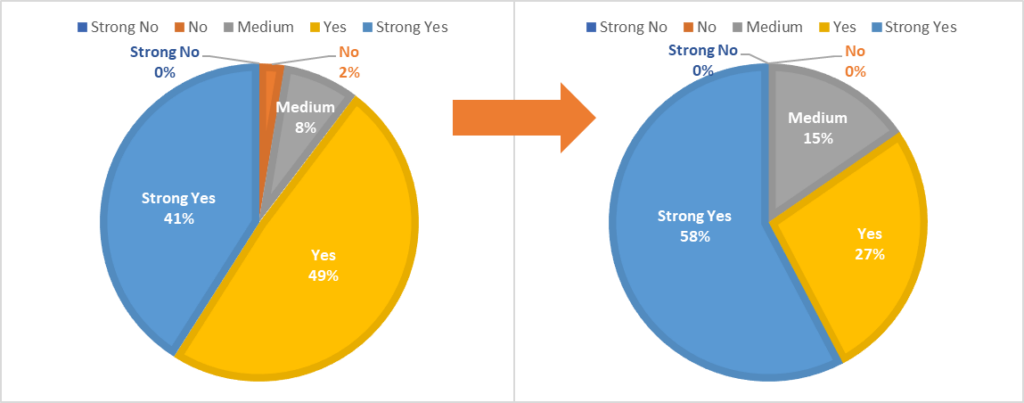
The number of students who answered that they would like to challenge themselves decreased from 90% to 85%. This means that fewer students now feel that they cannot be recognized unless they take on a challenge or achieve something big. It is the result of realizing that challenges or staring a business are not necessarily the way to increase their value. In an environment where there were many other students aiming to start a business, there were some students who were pushing themselves to take on challenges, but this decreased number may be the result of facing what they really want to achieve.
However, this is not necessarily the final willingness to challenge. After spending four months deepening their Self-Understanding and being released from the sense of duty and impatience that bound themselves, they can take it as the second survey result that they reset their consciousness and became free. After opening their consciousness, they will be able to freely explore the path they truly desire, so it is expected that they will be motivated to take on challenges when they begin to see their direction. For this reason, the Vision workshop, which is programmed as a flow to timely boost the willingness of the students to take on challenges by being delivered after the Self-Establishment workshop.
22.I have a vision (ideal future) that I want to achieve.
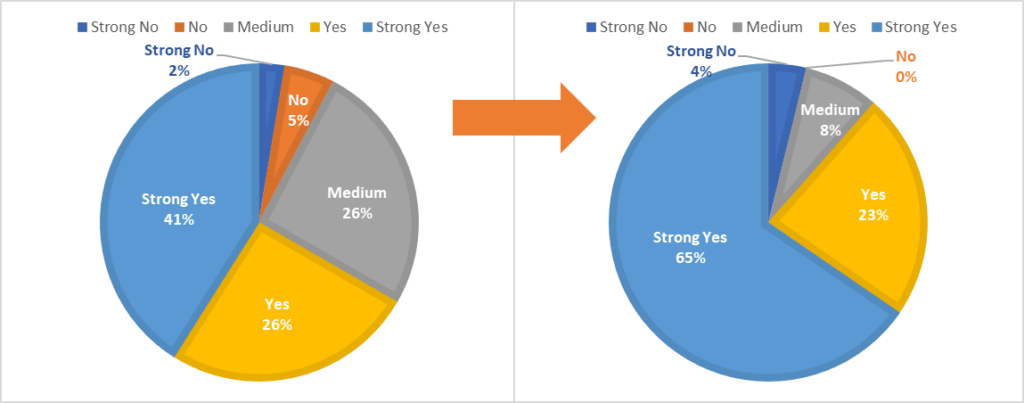
This time it was a workshop to establish self awareness and there was almost no mention of vision, but just by Self-Establishing, the number of students who got to have a vision increased from 67% to 88%.
23.I am very fulfilled in the vision I want to achieve (ideal future).
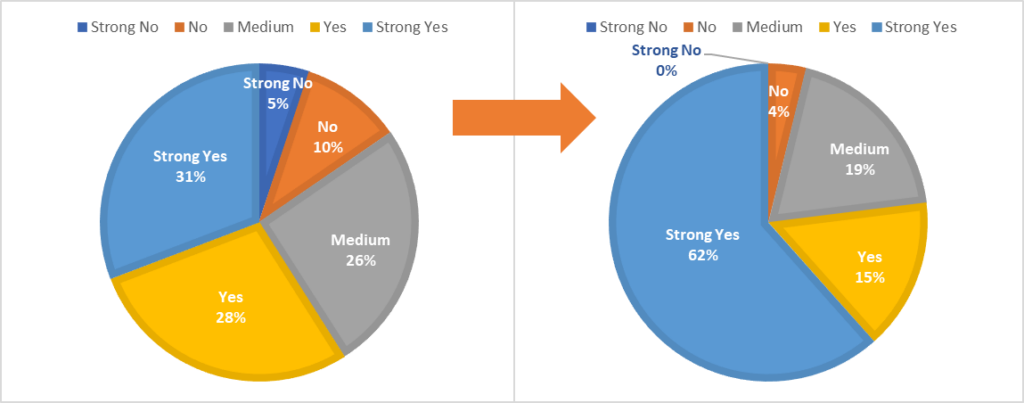
In this question, we measured the extent to which they perceive their vision as their own. Those who can imagine themselves fulfilling their vision have risen from 59% to 79%. Again, the theme of this workshop is to Self-Establishment, so the results are at a stage where the vision part is barely mentioned.
24.The vision (ideal future) I want to achieve includes the happiness of other people.
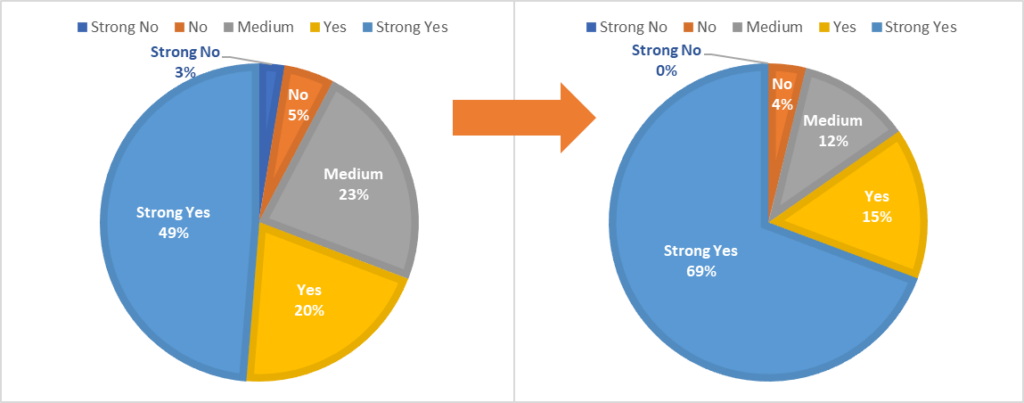
The Vision workshop will deepen their understanding of the importance of having an altruistic vision, which is not covered in this workshop on Self-Establishment. However, by deepening Self-Understanding, Self-Approval, and Self-Trust, interest in others and acceptance of others emerge. This question is proof of that.
The percentage of students who include the happiness of others in their vision has increased from 69% to 84%. In the future, if they take the Vision part and deepen their understanding of the definition, effect, type, and quality of vision, this number may increase further.
25.When I think of a vision (ideal future) that I want to achieve, a concrete image (such as an photo or video) comes to mind.
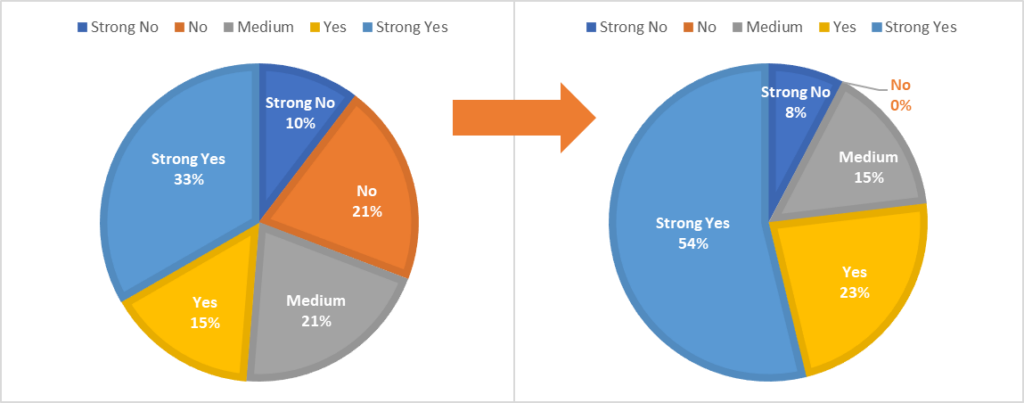
This is a question that measures the strength of the ability to have an ideal future/vision. The number of students who see Visions as images that move their hearts or emotions rather than as words has risen from 48% to 77%. This is also a numerical value at the stage where there is no mention of the effect and method of setting the vision as a concrete image.
26.I believe that my future self will have the desired performance, evaluation, and income.
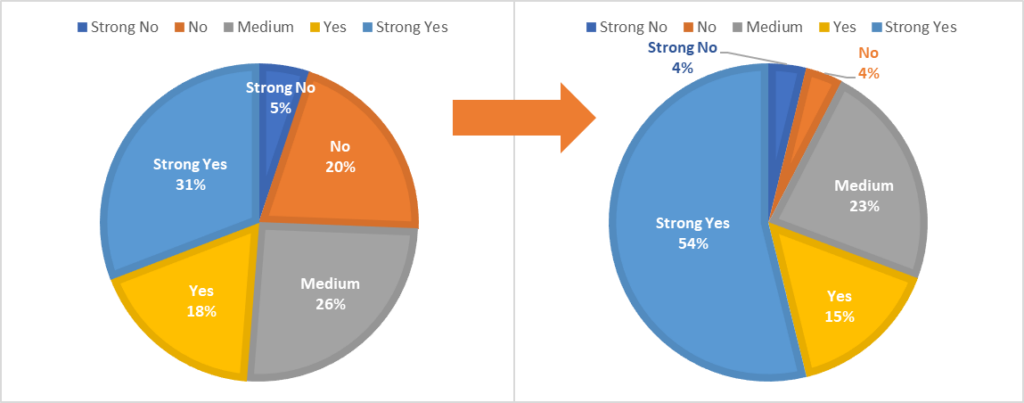
This is a question that measures how much they allow themselves to achieve their ideal future and whether they limit themselves. The percentage of students who believe they are living their ideal future has risen from 49% to 69%. We cannot expect a big increase in numbers just by being aware of their own abilities and vision. The important thing is to have a sense of security that they are more aware of their potential than anyone else, and this sense needs to be secured by themselves..
27.I want to make my vision come true by working together with my team members.
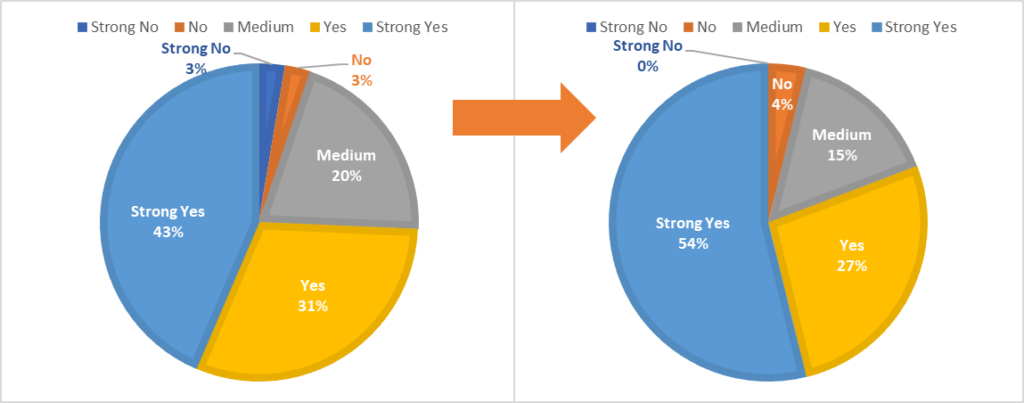
Following the Self-Establishment workshop, Vision, Diversity, and Cooperativeness workshops are conducted. This time, Diversity and Cooperativeness parts are barely mentioned, but by having the opportunity to positively see the relationships with other participants in the workshop and the people they have met in their past, there was an improvement in awareness that leads to diversity acceptance and cooperativeness.
Those who answered that they would like to make their vision come true with their colleagues rose from 74% to 81%.
Once self-established to a certain level in a well-ordered procedure, the other awareness such as vision, diversity acceptance, and cooperativeness are automatically boosted. We call it “Springing-Up Mechanism” in MBDGs.
28.There is no superiority or inferiority in visions, and I believe that whatever vision I have is wonderful.
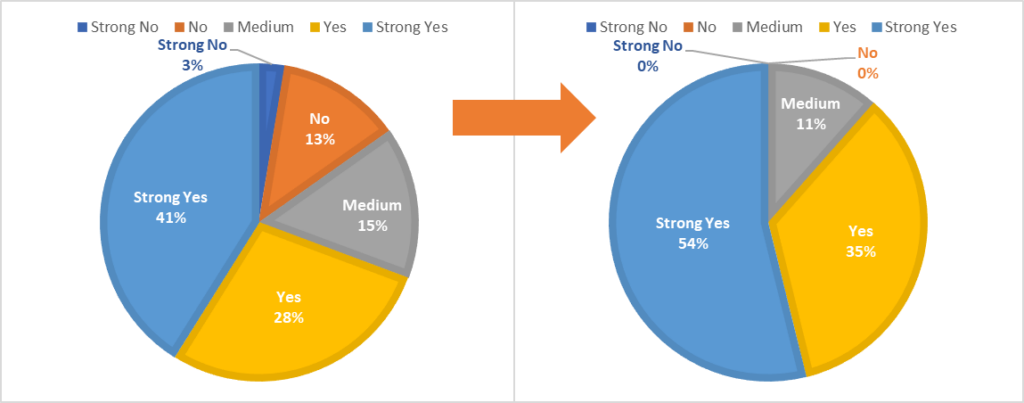
This increased from 69% to 89% to measure whether they can be confident in their own thinking without overcomparing themselves with others. This awareness is at the same time linked to an awareness that leads to diversity acceptance and cooperativeness.
29.I believe I can use my strengths to achieve my vision.
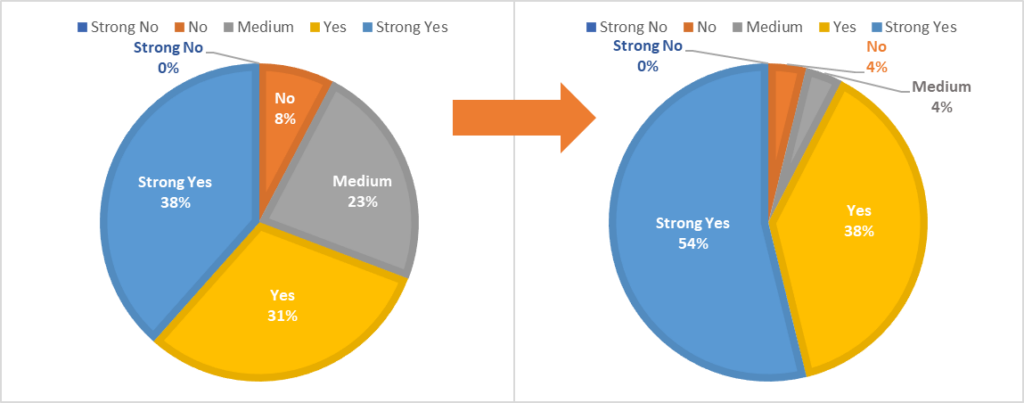
As mentioned above, there are multiple questions to ask whether they are most aware of their potential. The percentage of students who believe they can make the good use of their ability to achieve the vision has risen from 69% to 92%.
30.I would like to meet more people who think differently than I do.
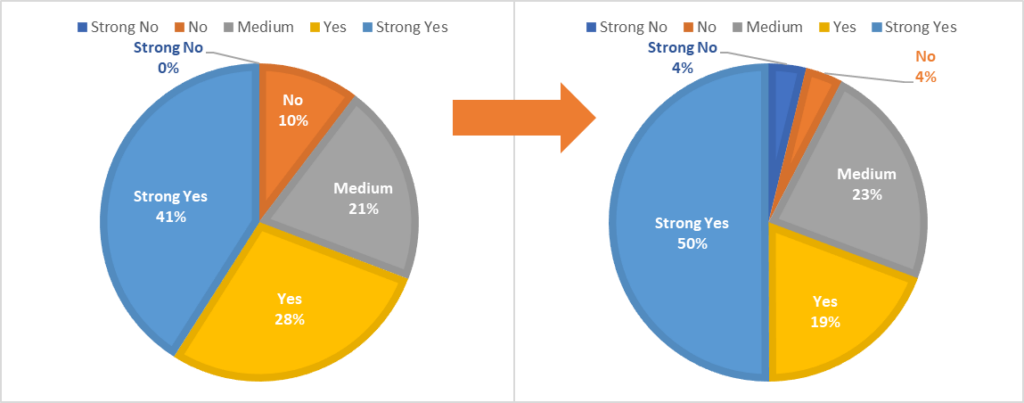
This is also a question that measures how much the Self-Establishment boosts the awareness that leads to diversity acceptance and cooperativeness. Interest in people who think differently than they do has increased from 56% to 69%. Diversity and Cooperativeness workshops have not yet been conducted, but show that the Self-Establishment has a positive impact on both elements.
31.I often think that there must be a reason why people say or do things that I can’t understand.
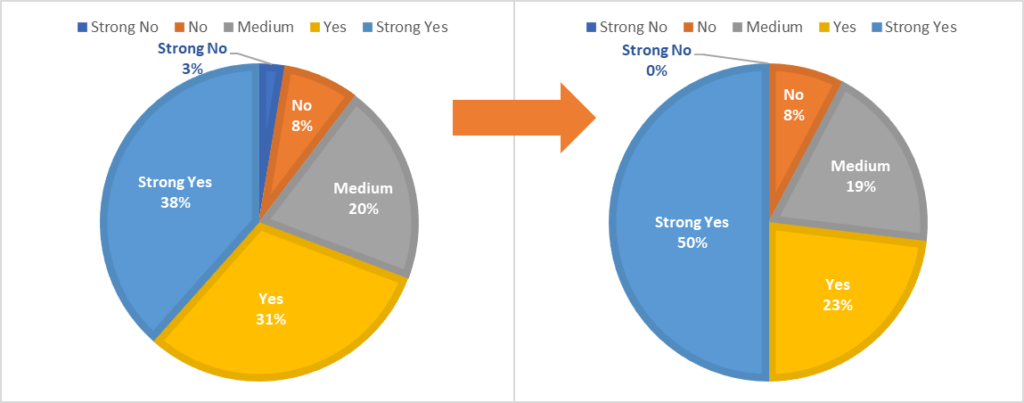
This is also a question that measures how much the Self-Establishment influences the awareness that leads to diversity acceptance and cooperativeness. The percentage of students who answered they often imagine the circumstances of someone who behaves in ways they can’t understand has increased from 38% to 50%.
32.I’m proud of my country.
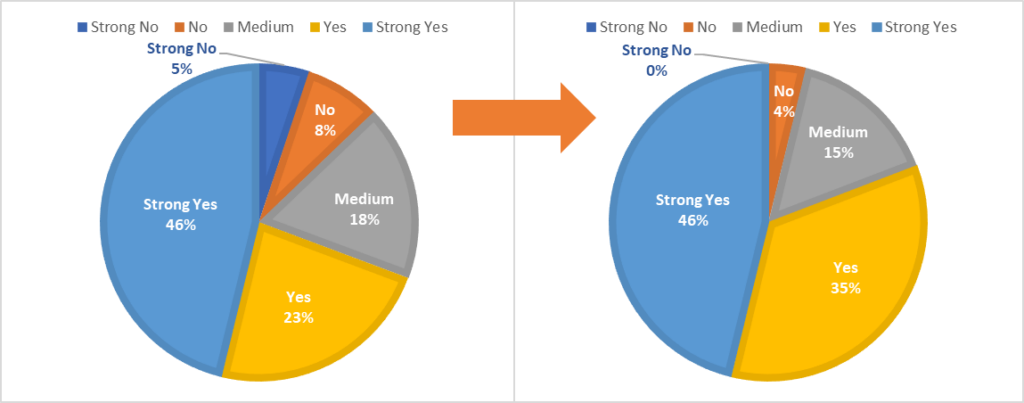
Part of the work to talk about one’s own country, which is delivered at the Diversity workshop, has been incorporated. This is a work where the point is to talk about their own thoughts about their own country, not a work to make them proud of their country or to recognize the good points of their country.
However, as a result, many of the students rediscovered the good points of their own country, and the percentage of those who felt pride in their own country increased from 69% to 81%.
At the workshop, while learning about the values of other countries, many of the Japanese students said that they realized for the first time the characteristics of Japanese people that are factors that reduce productivity. But many of them were finally to be proud of the good side of their country. This result is also greatly influenced by the fact that the students understood and acted on the rules of “how to speak out about oneself and how to listen to what others are saying” that were confirmed at the beginning of the workshop.
33.I feel embarrassed or not good at speaking English.
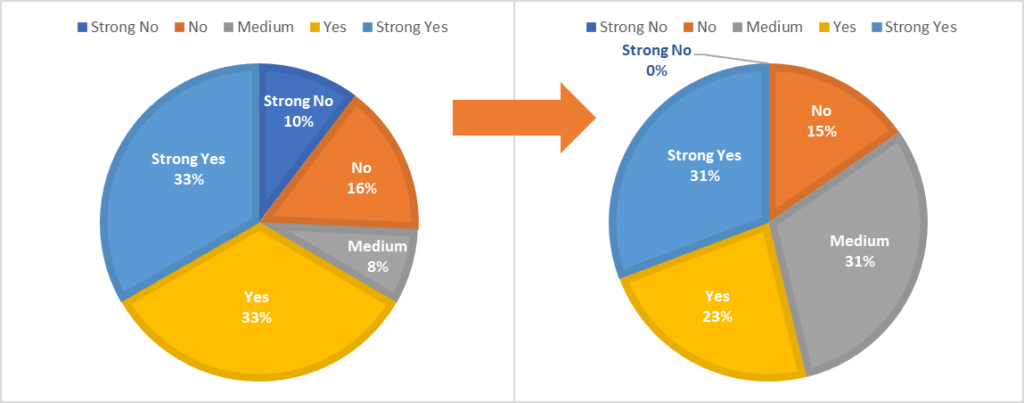
This workshop was basically conducted in English. Since the students’ English skills are not advanced, the trainer advanced the workshop while supplementing in Japanese. The percentage of students who feel they are not good at speaking English has decreased from 66% to 54%.
The effect of conducting workshops in English for non native participants is not only to improve their English skills, but also to make it a habit to express their thoughts in a straightforward manner. However, this is effective for participants with intermediate or higher English proficiency (if they can express themselves by connecting words and grammar, e.g. I want to do …, because I like …, etc). On the other hand, if their English proficiency is low (if they cannot come up with the words they want to convey), it will be difficult for them to deepen their English proficiency and Self-Understanding even if they attend workshops conducted in English.
34.I think it’s fun to talk to people about myself, listen to what people have to say, and deepen relationships.
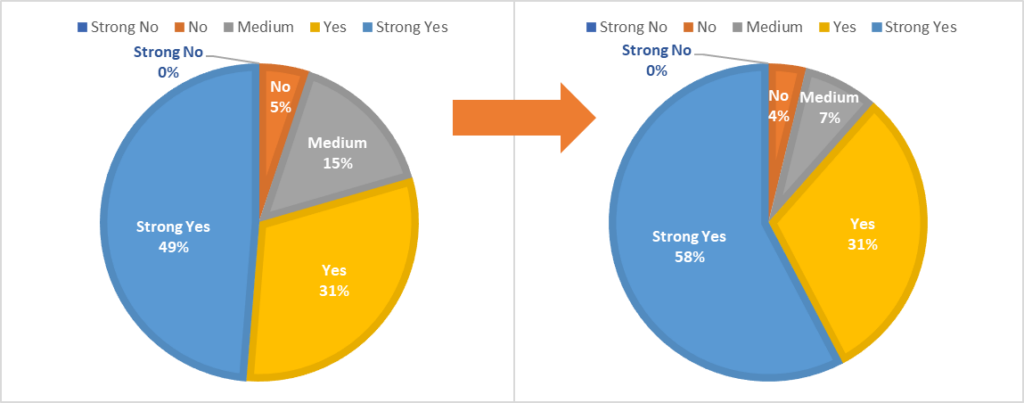
This is a question to measure how much they enjoy self-expression and understanding others. Through the 4-month workshop, 89% of the students ultimately felt that it was fun, and 58% answered that it was “very fun” by having many opportunities for self-expression and understanding of others with a rise from 49%.
Approximately 30% of the students seemed to have difficulty communicating with others to begin with, but it was these people who showed a remarkable improvement in their positive attitudes at workshop. Many of them were the ones who broke out of their shells and received high praise from other participants in the self-expression presentations in the final month.
Voice of participants
- My self-esteem was increased.
- I became to want to assert myself more.
- I thought Japan and my sense of values were heretical when viewed from the outside world.
- I am not afraid to change anymore.
- I felt that I should try to act on my own thoughts and will a little more.
- It was great because I had the opportunity to reflect on myself through the classes.
- I got more self-confidence.
- It made me feel more confident in what I was trying to do.
- We should speak English with confidence.
- I think it would be nice if I could be more positive because my personality is good enough. Through the class, I felt a little better as I was, so I felt lighter.
- I got to be able to self-analyze through the class, so I want to improve my bad points and develop my good points. I want to change my shyness.
- I still don’t understand myself enough, so I’m going to continue to have a proper self-understanding.
- I felt more accepting of my past.
- I will never put up with fun things by making an excuse!
- I wanted to acquire the ability to express myself independently.
- I became able to speak a little English.
- I will not be too afraid of challenges anymore.
- I thought it was not good to try too hard and overdo.
- I want to value my individuality more.
- I don’t want to change myself. I’m good enough and just want to develop through experiencing.
- I changed my mind by taking this class.
- I came to recognize myself.
- I became to be able to communicate with people a little more.
- I think to make a place to escape is good.
- I could acquire not only English ability but also proactiveness toward life.
Trainer’s opinions
This time, we confirmed the effects in all three steps (Self-Understanding, Self-Approval, and Self-Trust) necessary for Self-Establishing. In addition, we were able to confirm that once Self-Established to a certain level, vision, diversity acceptance, and cooperativeness are boosted as a result. The results were as expected.
By continuing to hold workshops on Vision awareness, Diversity acceptance, and Cooperativeness, which are programmed after Self-Establishment workshop, Self-Awareness will be further established, and sustainable and stable vision awareness, diversity acceptance, and cooperativeness will be available.
About the schedule
Since this workshop was held as a first semester course at university, a total of 15 90-minute classes were held, 3 of which included other programs (Social Entrepreneurship Program and others), and 12 MBDGs workshops. Also, out of the 12 workshops, the time spent on improving communication skills in English was 15-20 minutes each.
In this workshop, the Self-Approval part took longer than expected, so we were not able to cover all of the Self-Trust part.
The time required for the Self-Establishment depends on the characteristics of the participants, but this time it was about 18 hours. Each of the three steps (Self-Understanding, Self-Approval, and Self-Trust) takes about 6 hours basically, but in this workshop it took 6 hours, 9 hours, and 3 hours in order from Step 1. However, since the three steps are linked, there were many times when we covered other steps in a planned step.
About assignments
In order to maximize the effect of the workshop, it is necessary to work on the assignments. There were 8 types of assignments, and the final assignment was a self-expression presentation.
By looking at the assignments and presentations, the trainer recognized that the workshops lead to the confidence and self-esteem of the participants. In the assignments (descriptive format) to deepen Self-Understanding and Self-Approval, it was found that the participants were facing themselves, that facing themselves had become a habit, and that they were struggling to break out of their shells.
About students
Many of the participants are students who aim to start a business, but it cannot be said that many of them had high levels of self-esteem and self-confidence. The trainer was able to confirm that there are many students who aim to start a business out of an inferiority complex or impatience. This resulted in the Self-Understanding and Self-Approval parts taking longer than planned.
Student attendance was very high, but less than half attended all classes.
Changes that were seen in participants who were originally highly proactive were that they acquired skills to stabilize their own mind/awareness, and they began to show more cooperative and leadership behaviors in relation to other participants. They understood the meaning of the workshop from an early stage and mentioned to the importance of participating in the workshop. It is true that their positive behavior and changes has increased the educational effect on other students.
In the self-expression presentation, the trainer was impressed by the awareness and attitude of having confidence in oneself and one’s own ideas by improving the habit of comparing oneself with others too much and focusing too much on one’s own shortcomings. At the beginning of the workshop, the participants, who hardly talked to anyone, were reluctant to speak up or make presentations in the workshop, and had a strong resistance to outputting their own thoughts. However in the last workshops, they raised their hands to get their turn to self-express, and expressed themselves in a loud and confident voice.
About the trainer
The trainer went around each table, looked at the worksheets carefully, listened to what the students said, and tried to understand the students deeply. As a result, the trainer was able to build a trust relationship with the students. The trainer believes that this trust relationship led to secure of mind among the participants, which greatly boosted the effectiveness of the workshop.
In addition, the trainer was thoroughly conscious of the following points and communicated them to the participants everywhere.
・Students do not need to change themselves
・The answers and potentials you need are already within you
Another point the trainer put importance was to accept any opinions from the students and never to show negative reactions to what they express.
Once a trust relationship is established with the trainer, the students will try to talk more with the trainer. Some of them speak to gain some kind of awareness or learning, while others speak to reassure their uneasy feelings. Especially in the latter case, the trainer was careful not to become a reassuring presence. If the trainer engages in a way that eases the anxiety of the students, it may create dependence and hinder the students’ growth. What the trainer tried to do was that to support them to find and face to their uneasy feelings and find their answers.
It is no exaggeration to say that the effectiveness of the MBDGs workshop depends on whether or not the trainer is more enthusiastic and sincere than anyone else in his or her own Self-Establishment, and this time the trainer felt that fact several times through the workshop. There were many scenes, especially in the Self-Trust part, we see the conflicts that arise in many students, but the workshop proceeds based on the trainer’s early understanding that the students have the power to overcome conflicts. The trainer’s ability to understand well early comes from the trainer’s own mind born from Self-Establishment. The students this time are of various types, including students who participated in national sports competitions when they were in junior high and high school, students who have continued to participate in the Robocon World Championship since junior high school, and students who run companies. On the other hand, there were also a certain number of students who had nothing they wanted to do and had a neglectful feeling about life and society. It was difficult to hold a workshop in such a situation, and there were many situations where the trainer felt that the trainer’s Self-Establishment was being questioned. Through the workshops and interaction with the students, the trainers were given many learning opportunities.
About teaching materials
There are about 12 pages of teaching materials used in the Self-Establishment part, and they are basically filled out by the students. In the final month, the student submitted all pages to the trainer. This time, the trainer returned everyone with a comment.
Understanding of Organization
This time, the MBDGs workshop was introduced to the university because the university already understood the necessity of mind development. If the university or organization that is trying to introduce workshops does not have an awareness of the problem in terms of student self-awareness, or if there is an awareness of the problem but the reform system of the organization has not caught up, it is not the time to start the workshop. The starting line is that the organization recognizes the importance of a curriculum that cultivates the mindset.
In addition to improving the mindset of existing students, the fact that the introduction this time was judged to be positive for the university’s goal of increasing the number of applicants seems to have been one of the reasons for the introduction of the workshop.
Although it depends on the circumstances of the organization, MBDGs believes that it is ideal for sustainable development of the organization to train several trainers within the organization and to make workshops in-house in the future.
About workshop visit
Workshop visits are welcome at any time. Please let us know if you’re interested.


